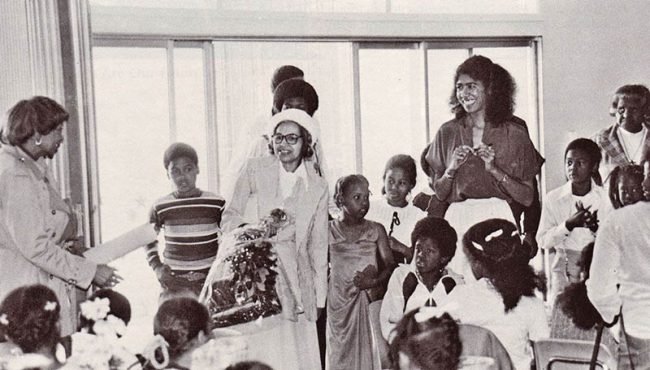The Rebellious Lives of Mrs. Rosa Parks
Lesson by Bill Bigelow
During the 1979–1980 school year, Mrs. Parks visited the Oakland Community School (OCS), an elementary school run by the Black Panther Party. Educator and Black Panther Party leader Ericka Huggins is the woman standing among the children. Photo by Donald Cunningham. Source: Ericka Huggins and Lisbet Tellefsen
This lesson was inspired by the title of Jeanne Theoharis’s fine book, The Rebellious Life of Mrs. Rosa Parks. In response to the COVID-19 pandemic, and the shutdown of schools across the country, the Zinn Education Project has sponsored seminars we’ve called “People’s Historians Online.” The first were conversations between Rethinking Schools editor and Seattle teacher Jesse Hagopian and Brooklyn College professor and author Jeanne Theoharis, about the misrepresentation of Rosa Parks in the dominant narrative of the Civil Rights Movement.
The sessions were wonderful — filled with story after story of Mrs. Parks’ lifelong commitment to racial justice. Theoharis emphasized that although textbooks and national tributes often focus only on Mrs. Parks’ courageous gesture of refusing to give up her seat on a Montgomery, Alabama, bus to a white man, Mrs. Parks’ entire life is a tapestry of resistance. And, indeed, she spent more than half her life in the North — which Mrs. Parks called “the Northern promised land that wasn’t” — fighting segregation and injustice there.
Listening to Prof. Theoharis tell stories about Rosa Parks’ “rebellious life” — from when she was 6 years old after World War I, sitting on her grandpa’s porch waiting for the Klan to show up, to marching against South African apartheid in her 70s — it struck me that one way to animate Mrs. Parks’ “lives” in the classroom would be for students to encounter some of these through a mixer role play.
In this activity, instead of students representing different individuals as they do in other mixers, every student portrays a different rebellious moment in Rosa Parks’ life. And through meeting one another, students surface the patterns of defiance on behalf of justice that coursed through her life. By sharing stories with each other, students are able to pry behind the “she was just tired” myth.
. . . It makes no difference how much or how little students know about Rosa Parks; the mixer should help them gain a broader appreciation for her life of commitment and, yes, rebellion. Please share your teaching experiences of this activity with the Zinn Education Project, and we will update the lesson as we experiment with it ourselves.
Read more about this lesson in the Rethinking Schools article by Bill Bigelow, Teaching the Radical Rosa Parks.

